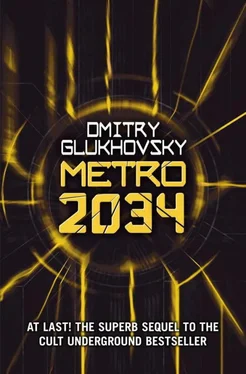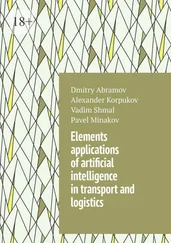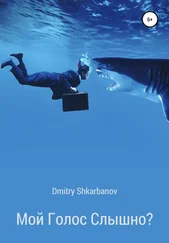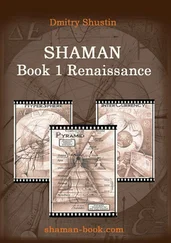Denis Mikhailovich left the trolley and walked on with them for a few minutes, swapping phrases with Hunter – snatches of speech that were deliberately clipped and crumpled, so that Homer couldn’t unfold and interpret them.
‘Where will you get them?’ he asked the brigadier gruffly.
‘They’ll give me them. They won’t have any choice,’ Hunter boomed, looking straight ahead.
‘Everyone stopped expecting you back ages ago. For them you’re dead. Dead, you understand?’
Hunter stopped for a moment and spoke in a low voice, as if he were talking to himself, not the perimeter commander.
‘If only it was all that simple…’
‘And desertion from the Order – that means a fate worse than death.’
Without answering, the brigadier swung his hand up, simultaneously saluting the colonel and lopping off an invisible anchor cable. Denis Mikhailovich took the hint and stayed behind on the dockside while the brigadier and the old man moved slowly away from the shore, as if they were fighting a reverse current, and set off on their great voyage across the seas of darkness.
The colonel lowered his hand from his temple and signalled to the helmsman to start the engine. He felt desolate, left with no one to issue ultimatums to and no one to wage battle against. As the military commander of an island lost in one of those dark seas, all he could hope for now was that the little expedition wouldn’t get lost out there and would return home some day – from the other side, proving in its own small way that the world really was round.
The final guard post, located in the stretch of tunnel immediately after Kakhovka, had been almost deserted. For as long as the old man could remember, no one had ever attacked Sebastopol from the east.
Now the patch of yellow seemed less like a marker, dividing the endless concrete intestine into arbitrary sections, than a cosmic lift, connecting two planets that were hundreds of light years apart. Beyond it, the inhabitable space of Earth was imperceptibly replaced by a dead lunar landscape, and the apparent resemblance between them was a deception.
As he focused on setting one foot in front of the other in his incredibly heavy boots and listened to his own strenuous breathing, penned into a complex system of fluted tubes and filters, Homer imagined he was an astronaut who had landed on a satellite of some distant star. Indulging in this puerile fantasy made it easier for him to adjust to the weight of his suit – he could explain that by the high gravity – as well as the fact that they would be the only living creatures in the tunnels for kilometres ahead.
All the scientists and science-fiction writers never got their forecasts of the future right, thought the old man. By the year 2034 the human race should have been master of half the galaxy, or at least the solar system, for a long time already – Homer had been promised that when he was a child. But the science-fiction writers and the scientists had both started from the premise that humanity was rational and consistent. As if it didn’t consist of several billions of lazy, frivolous individuals who were easily distracted, but was some kind of beehive, endowed with collective reason and a unified will. As if, when it set about conquering space, it had really intended to take the task seriously and not abandon it halfway when the game got boring, turning its attention to electronics and then moving on to biotechnology, without ever achieving any really impressive results in anything. Except, perhaps, for nuclear physics.
So here he was, a wingless astronaut, a nonviable life-form without his cumbersome protective suit, an alien on his own planet, exploring and conquering the tunnels from Kakhovka to Kashira. And he and all the other survivors could simply forget about anything more ambitious than that.
It was strange: here, beyond the yellow marker, his body groaned under the fifty per cent increase in the force of gravity, but his soul was soaring, weightless. The day before, when he said goodbye to Elena before the expedition to Tula, he was still counting on coming back. But when Hunter named Homer again, choosing him as his partner for the second time in a row, the old man had realised there was no way he could weasel out of it. His insistent prayers to be tested and enlightened had finally been heard, and trying to back out now would be stupid and unmanly. He couldn’t treat his life’s work as a part-time job. It was pointless to play coy with destiny, promising to devote himself to his work wholeheartedly a bit later on, the next time around… There might not be any next time, and if he didn’t set his mind to it now, what would he carry on living for afterwards? To end his days as the unknown Nikolai Ivanovich, a local crackpot, a drooling old storyteller with an erratic smile? But to make the transition from a grotesque caricature of Homer to the genuine article, from an obsessive fantasist to a maker of myths, to rise out of the ashes renewed, first he would have to cremate his former self. He realised that if he carried on doubting and started pandering to his yearning for a home and a woman, if he constantly looked back, he was certain to miss something very important up ahead. He had to wield the knife.
It would be difficult for him to return from this new expedition unharmed, or even to return at all. And though he felt terribly sorry for Elena, who couldn’t believe at first that Homer had reappeared at the station alive and well after only one day away, and then cried when she failed to change his mind and saw him off again into oblivion, this time he hadn’t promised her anything. As he hugged Elena tight against him, he looked over her shoulder at the clock. He had to go. Homer knew it wasn’t easy to amputate more than ten years of life just like that, he was bound to suffer phantom pains after the loss. He had expected to feel the urge to look round all the time, but once he stepped beyond that thick yellow boundary marker, it was as if he had really died, and his soul had soared free, breaking out of both of its ponderous, unwieldy, physical shells. He had escaped.
Hunter didn’t seem to be hampered at all by his protective suit. The loose clothing bulked out his muscular, wolfish figure, transforming it into an amorphous colossus, but without reducing its agility. He walked along side by side with the panting old man, but only because he was still keeping a close eye on him after Nakhimov Prospect.
After what Homer had seen at Nagatino, Nagornaya and Tula, agreeing to carry on roaming the tunnels with Hunter hadn’t been an easy decision. But he had found a way to convince himself: the long-awaited metamorphoses heralding his rebirth had begun while he was with the brigadier. And it didn’t matter why Hunter had dragged him along again – to set the old man on the right path or to use him for spare rations. The most important thing for Homer now was not to let this new condition slip away, to exploit it while he still could, to invent things and write them down.
And another thing. When Hunter asked him to come, Homer seemed to sense that the brigadier needed him in almost exactly the same way – not in order to guide him through the tunnels and warn him about the dangers. Perhaps in nourishing the old man’s energies, the brigadier was also taking something from Homer, without asking permission. But what could he possibly need?
Hunter’s apparent lack of emotion could no longer deceive the old man. Under the crust of that paralysed face, magma was seething, occasionally splashing out through the craters of those smouldering eyes that didn’t close. He was in turmoil. He was searching for something too.
Hunter seemed to fit the role of the future book’s epic hero. Homer had hesitated for a while and then, after the first few trials, accepted him. But there were many things about the brigadier’s character, such as his passion for killing living things, the words he left unspoken, and his miserly gestures, that made the old man wary. Hunter was like those killers who taunted and provoked the police detectives, wanting to be unmasked. Homer didn’t know if Hunter saw him as a confessor, a biographer or an organ donor, but he sensed that this strange relationship of dependence was developing into something mutual, growing stronger than fear. And Homer was haunted by the feeling that Hunter was putting off a very important conversation. Sometimes the brigadier turned to him as if he was about to ask something, and never actually spoke. But then, perhaps the old man was merely indulging in wishful thinking and Hunter was leading him on deeper into the tunnels so that he could wring an unwanted witness’s neck. More and more often the brigadier’s eyes turned to probe the old man’s knapsack, with the fateful diary lying in the bottom of it. He couldn’t see it, but he seemed to guess that some object hidden in the knapsack attracted Homer’s thoughts like a magnet, and he was tracking those thoughts, gradually closing in on the notepad. The old man tried not to think about the diary, but it was futile.
Читать дальше











